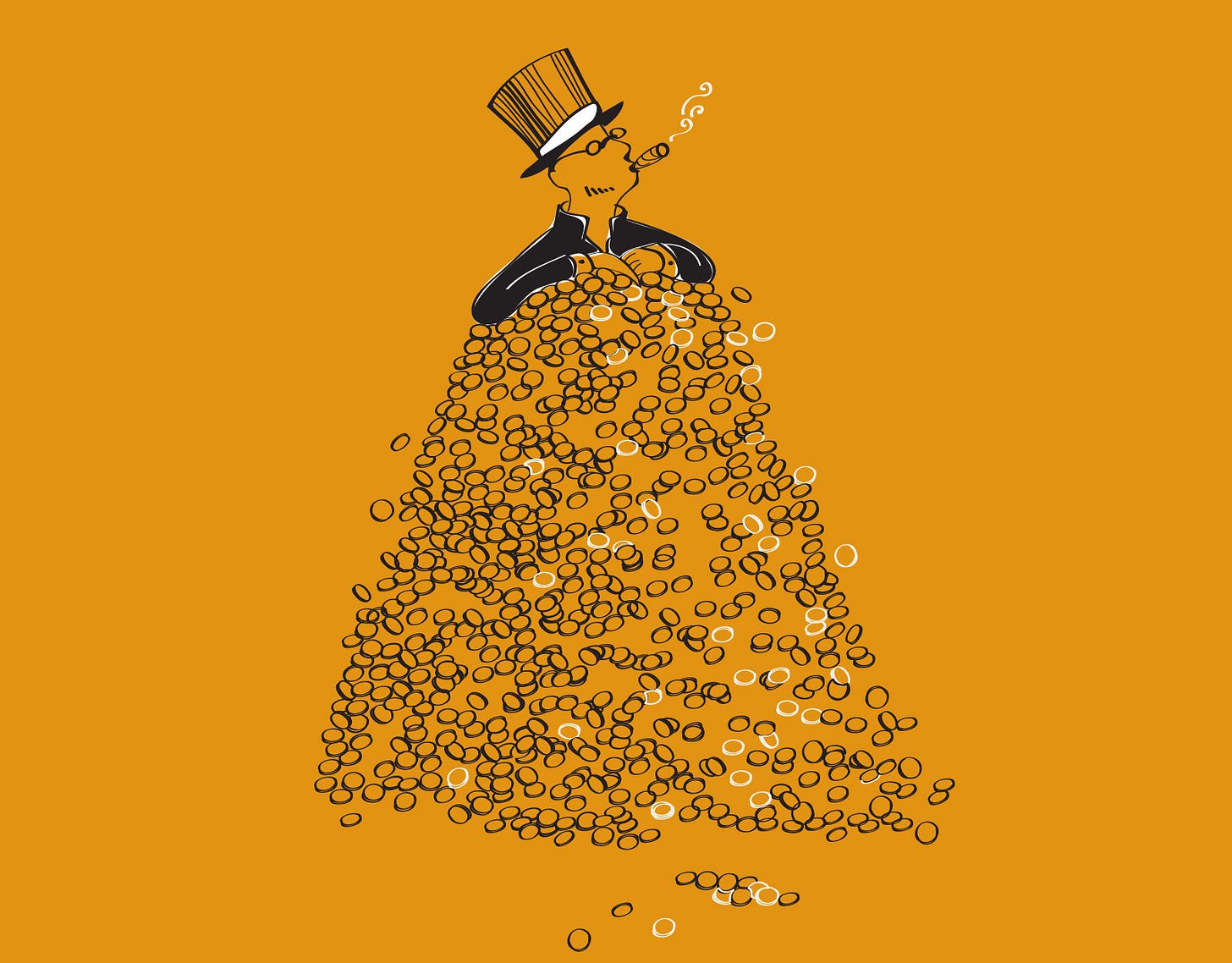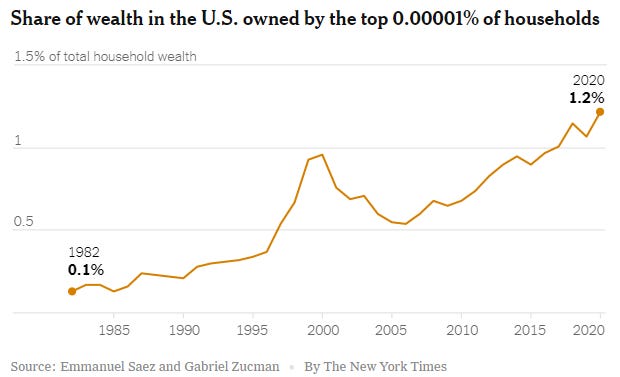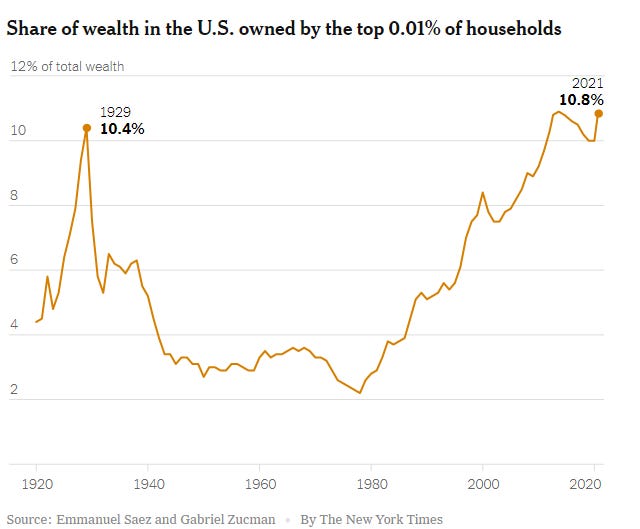First of all, thank you for your generosity! Since we set up this page yesterday, Bulwark readers have contributed more than $50,000 to support the extraordinary work of World Central Kitchen in Ukraine and communities in crisis around the world.
ICYMI, here’s my conversation with Chef José Andrés in Ukraine the other day.
In our discussion on Tuesday’s podcast, Will Saletan and I didn’t really resolve the question: Does America have an oligarch problem?
But it seems like a conversation we ought to have, especially since the oligarchs are back in the news: On an almost daily basis Russian oligarchs are losing their super-yachts, while American billionaires are scooping up major social media networks.
But we don’t like to call them oligarchs do we?
So let’s try to define our terms here. A quick internet search turns up this definition of an oligarch as “a very rich business leader with a great deal of political influence.”
Here’s a longer definition from Dictionary.com:
An oligarch is one of the select few people who rule or influence leaders in an oligarchy—a government in which power is held by a select few individuals or a small class of powerful people.
But I think Will offered the most apt definition of an oligarch: “A rich guy I disagree with.”
It has always been thus. In the Gilded Age, one’s attitude toward rich industrialists determined who was considered a “Robber Baron” and who was a “Captain of Industry.”
Still, by any measure we are living through a new Age of Billionaires. A couple of years ago, two economists highlighted the amount of wealth owned by the richest 0.00001 percent of Americans. This is what the wealth of just 18 households looked like:
As David Leonhardt noted yesterday:
This wealth conveys vast power on a small group of people. They can attempt to shape politics, as the Koch family has done. They can create a global charity, as Bill Gates and Melinda French Gates have done. They can buy a national media organization, as Jeff Bezos has done.
This is part of a larger pattern. The top 1% of Americans now control about a third of the nation’s total wealth, and the hyper-rich (the top .01%) continue to increase their concentration of wealth. You don’t have to be Bernie Sanders to recognize that this has consequences. Again, via Leonhardt:
A small number of very wealthy people end up making decisions that affect millions of others. That has always been true, of course. But it is truer when inequality is so high. In the U.S. economy, wealth inequality has exceeded even the peaks of the 1920s:
So, is this something we need to worry about? Is oligarchy only a Russian problem? Or is it just possible that we have an even bigger issue?
On the podcast, I asked: “Do any Russian oligarchs have the power and influence that our oligarchs have?”
Who is the Russian Elon Musk? Who is Moscow’s Mark Zuckerberg? Or Jeff Bezos? Or Rupert Murdoch?
This brings us to another important distinction. As Will mentioned on our podcast, it matters whether the super-rich exercise their power through the government, or whether their power is confined to the private sector, including the social media platforms. That’s a distinction that’s too often ignored in these debates.
But the problem is that it’s hard to draw a a bright red line between private oligarchical power and government. This is why crony capitalism is so dangerous. And while critics on the left have bemoaned the influence of money in politics, they’ve often been slow to recognize the danger of so much politics/government in the detailed management of the economy.
A government that has the power to pick winners and losers creates massive incentives to buy influence and curry favor. Generations of business executives have discovered that it is far easier to jump on a Gulfstream jet to fly to Washington D.C. and wring a few billion dollars from compliant senators than is to invest in actual innovations. Much of our economy/politics is now taken up with currying favor with legislators, cajoling regulators, and appeasing administrations.
**
This brings us back to Will’s definition. Do we have a problem with oligarchs? or just oligarchs we don’t like? Here’s an exercise you can play at home or at the office: (You can record your feelings either in words or interpretative dance.)
How would you feel if you knew that George Soros and Bill Gates had a meeting to decide how they would influence the 2024 election?
How would you feel if it was Rupert Murdoch, Richard Uihlein, Rebekah Mercer, and Peter Thiel, who coordinated dark money/media strategy to influence judges and politicians?
What if we learned that Mark Zuckerberg and Elon Musk sat down and discussed how their algorithms could effect the outcome of the presidential election?
What about a conference call with Jeff Bezos, Zuckerberg, Musk, and Murdoch to build opposition to tax hikes on billionaires?
Too tepid?
How about this: Imagine Chinese officials meet with Musk to review his investments in China and suggest that the government would be most appreciative if Twitter did not include any mention of the Uyghurs?
Even fellow oligarchs seem curious:


Too far-fetched?
What about a one-on-one discussion between a restored President Trump and Musk (or Zuckerberg or Bezos) about the government’s anti-trust policies, tax subsidies, SEC investigations, and Twitter/Facebook algorithms about elections?
What if Trump asks, “Elon, I’d like for you to do us a favor.”
Are we still ok?
Is Kevin McCarthy toast?
The entertainment wing of the GOP has turned on the GOP Leader:
“Those are the tape-recorded words of Congressman Kevin McCarthy, a man who in private, turns out, sounds like an MSNBC contributor.”
Exit take: How bad is this for Kevin? Bigly.
Maybe Ron DeSantis didn’t think this out
Via the Miami Herald: “Disney tells investors state can’t dissolve special district without paying debt.”
As Florida legislators were rushing through passage of a bill to repeal the special district that governs Walt Disney World last week, they failed to notice an obscure provision in state law that says the state could not do what legislators were doing — unless the district’s bond debt was paid off.
Disney, however, noticed and quietly sent a note to its investors to show that it was confident the Legislature’s attempt to dissolve the special taxing district operating the 39-square mile parcel it owned in two counties violated the “pledge” the state made when it enacted the district in 1967, and therefore was not legal.
The result, Disney told its investors, is that it would continue to go about business as usual.
Musk’s free speech argle-bargle
At the risk of getting myself banned from the Brave New Twitter, this is totally and bizarrely incoherent.


Musk appears to think that only government has any role in regulating what private individuals and outlets can say (or something). And he gets that wrong.
“If people want less free speech,” they will ask government to pass laws to that effect.” WTF? does he even understand the First Amendment, and its limits on the ability of the “people” and the “government” to limit free speech.
And then there is the question of what he means by “censorship” vs. the exercise of responsible judgment:


My advice: buckle up, folks.
Quick Hits
1. The Most Damning Part of the Meadows Texts
MUST READ by Will Saletan in today’s Bulwark:
Either Trump is lying, or he’s trying to overthrow the government based on an impenetrable delusion. Take your pick.
Now we’re compiling similar evidence against Mark Meadows, who was Trump’s chief of staff during the election. He, too, knew Trump’s accusations were false. And instead of telling the truth, Meadows helped spread the lies.
3. The Bizarre Russian Prophet Rumored to Have Putin’s Ear
Cathy Young with more remarkable reporting in this morning’s Bulwark:
The madness of Vladimir Putin’s war in Ukraine has once again turned the spotlight on the creepy, enigmatic guru who has been called “Putin’s brain” or, irresistibly, “Putin’s Rasputin”: maverick “political philosopher” Aleksandr Dugin. And indeed, in many ways this is Dugin’s moment: For more than a quarter century, he has been talking about an eternal civilizational war between Russia and the West and about Russia’s destiny to build a vast Eurasian empire, beginning with a reconquista of Ukraine. Both the war in Ukraine and the new Cold War against the West can be said to represent the triumph—or the debacle—of Dugin’s vision.
The 60-year-old Dugin may or may not be Putin’s whisperer; there is no evidence that the two men have actually met. But his influence on the Putin-era ruling class in Russia is unquestionably real and scary. For one thing, much as the word “fascist” gets frivolously thrown around, Dugin is actually a onetime self-proclaimed fascist, albeit of the “real fascism has never been tried” variety. What’s more, there is every reason to think that while he dropped the label, his ideology has not changed much.
Cheap Shots
Rand Paul: Useless idiot.
Who needs “useful idiots” when you have Paul the Lesser?








Another comment off topic: Please, Charlie, do NOT have Deborah Birx on your podcast. I know she's shopping her book and is looking for publicity opportunities, but that woman was for over a year a shill for Donald Trump, even offering phony praise for Trump's intelligence and ability to understand Covid. She most certainly knew better. Having her on the program is akin to giving air time to former AG William Barr, who is also hawking a book.
Note to Senator Paul:
We have no plans to invade Kentucky. But if we need special operations to assist legitimate government, you'll be at the top of the list.
- Shawnee-Cherokee-Chickasaw Confederation